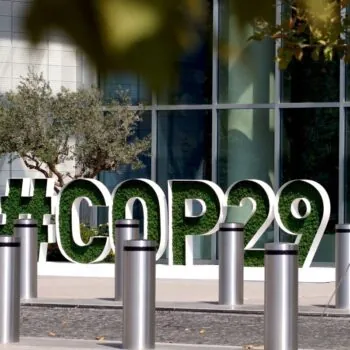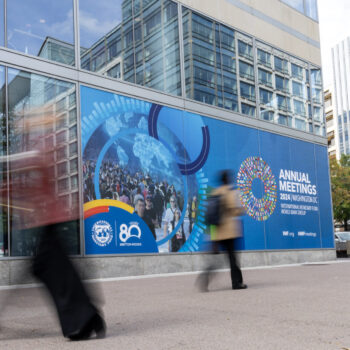Late last year I had the honour of chairing a multi-day roundtable sponsored by the Stanley Center for Peace and Security, ‘The Next Global Financial Crisis and Climate Change: A Policy Agenda to Align with the Paris Agreement’.
The aim of this meeting was to prepare the climate community to jump into action and use the next financial crisis, whenever it hit, for a shift in paradigm. By the end of the week, we had come up with a package of demands, policies and new rules that could be implemented in a future crisis – referred to as “the Playbook“.
Needless to say, we did not foresee the COVID-19 pandemic. The speed, scale and scope of this global shock and the economic and financial crisis in its wake is astounding. It is exposing the fragility of…well, everything. We expected a crisis, but not this one.
Introducing the Playbook
Out of ashes, phoenixes can rise. In the 20th Century, after the last great depression and the destruction wrought by two world wars, people demanded a different approach to politics, economics, and society. They demanded a social safety net and national insurance and health systems were introduced. They wanted good jobs for fair pay. They insisted their leaders cooperate and move beyond the ‘beggar thy neighbour’ nativist approaches that led to war and depression, and the Bretton Woods architecture was borne. None of this was easy or straightforward. Now it is up to us to shape the 21st Century recovery.
In this spirit, I present here the Playbook. It is by no means a perfect or finished product, but I hope that at this historic moment it offers food for thought. As a framework it will need underpinning with more robust analysis. My colleagues and I are working on this with our partners, while also broadening our approach to find common cause with other actors lobbying for a better economic model.
- Change the rules and norms for a fair, just, and 1.5°C-aligned global economy
A 1.5°C trajectory for greenhouse gas emissions reductions will be locked in – or not – in the aftermath of COVID-19. There will not be another opportunity to mobilise finance in the order of magnitude already seen over these past weeks. To stay aligned with Paris, economic recovery plans will need to be broad-based to tackle the multitude of vulnerabilities in the system from crippling levels of inequality to climate impacts and biodiversity loss.
With COVID-19, the global economy has ground to a halt, at untold cost. Public health systems are not up to par, and trust in government is at an all-time low. For decades shareholder returns have trumped investment in essential public services. But now, investments previously baulked at because of their scale (e.g. in green infrastructure) have been dwarfed by new economic response packages that ignore the previously dominant cost-benefit analysis that undervalues the cost of inaction. The balance between the public and private sector has shifted. If there is a window to rewrite the social contract between governments and people, what are the new norms in a world of multiple crises?
The Playbook calls for new metrics of progress and models of corporate governance. Economic growth measured by gross domestic product (GDP) is too flawed a measure for a complex, carbon-constrained world. It fails to account for negative externalities and is generally a poor indicator of the welfare of people. Coronavirus has revealed the need for new indicators, incentives and institutions to make markets work better and help drive political attention, public investment and international cooperation to deal with market failures.
- Guide a financial stimulus to expand and build the green economy
To stimulate the economy once the health risks are under control, money should go towards building resilience, not more risk. The Playbook sets out ideas on how to design conscious monetary and fiscal efforts to accelerate the transition to a more resilient economy. Business-as-usual is not neutral, quite the contrary; the imperative now is to focus any stimulus on the “right” things, and actively unwind the “bad stuff”—like fossil fuels. This is a time to re-structure our economies, so they are fit for the future and serve society.
There are many policies that can reduce inequality alongside emissions. For example, “helicopter money,” which refers to a transfer from central banks directly to citizens, funded from a one-time creation of money rather than from borrowing. These direct deposits could be earmarked for domestic green infrastructure spending, such as investments in home energy efficiency, renewable energy systems, or electric transportation creating new jobs, cutting emissions and saving households money. There are many more ideas like this to make the recovery fair and green.
The Playbook pays tribute to the Network for Greening the Financial System and the Coalition of Finance Ministers for Climate Action. We will see now if their rhetoric was real. Green Banks, Green Bonds and the Green New Deal will all need to be a big part of the post-COVID-19 stimulus story.
Rightly, development finance is being directed to immediate health system needs. Meanwhile the IMF faces funding calls from half of its membership, an unprecedented situation. We will need serious international cooperation and innovation to first service these needs but then also deal with the massive debt overhang once the dust settles. We can’t solve this crisis by ignoring the next one.
- Use this moment to implement a structural end to the use of fossil fuels
At the roundtable we discussed using a crisis moment for the early retirement of coal plants, not imagining we’d be talking about an oil and gas sector on the brink six months later. Before the COVID-19 crisis, bolstered by walls of debt and decades of government support, many oil and gas companies were hovering on just the right side of junk-bond status. The crisis response should take the opportunity to reshape these industries rather than return to business as usual.
With the price of oil at a 30-year low, this is a good time to phase out fossil fuel subsidies. The previous oil price plunge at the end of 2014 enabled over 40 governments to undertake reforms of their consumption subsidies.
Thinking outside the box
Last October, we tried hard to think beyond conventional wisdom on responses to economic crises. What we thought of as radical then, became almost mainstream overnight: direct payments to households, dividend bans, effective nationalisation of parts of the economy – by conservative governments no less. Space is opening for new ideas, so it’s imperative for us to have a few ambitious ones ready in the top drawer so we can recover better, faster and together. I don’t often quote Lenin, but he once said, “There are decades where nothing happens, and there are weeks where decades happen.” We are living those weeks right now.
Read the entire, Global Financial Crisis and Climate Change: A Playbook for Action, here.



